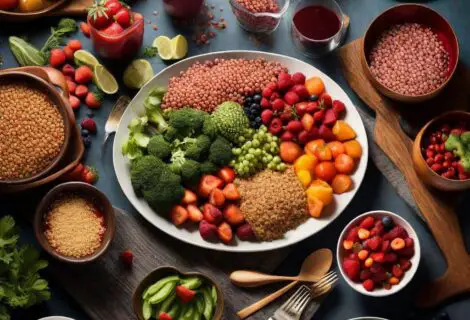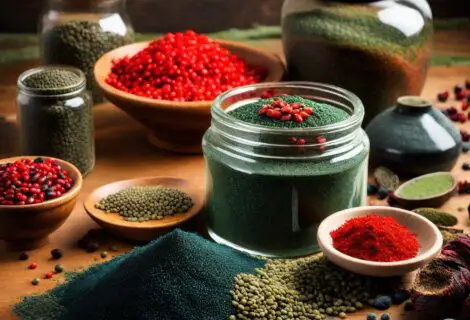Brain Foods: Your Pathway to Better Concentration
Introduction
In the era of digitalization, where screens dominate our work and social lives, maintaining mental fitness is paramount. Your diet plays a key role in this. Similar to fuel for vehicles, the food you eat determines your brain’s performance. In “Brain Foods”, we will explore further.
What Are Brain Foods?
Before getting into the specifics, let’s answer the burning question: What are brain foods? Simply put, brain foods are nutrient rich foods essential for brain function. They contain components like antioxidants, healthy fats, vitamins, and minerals. These elements are crucial for the brain’s performance and overall health, according to Dr. Vivienne Sinh Hau, a noted dietitian at Kaiser Permanente in Riverside, California.
Brain Foods and Their Benefits
For instance, Omega 3 fatty acids are a primary brain food. Their benefits are broad ranging, from improving brain function to promoting heart health^2^. Similarly, flavonoids, antioxidants found in berries, can delay brain aging and improve memory.
Sources of Brain Foods
Just as crucial as the nutrients themselves, the sources of these nutrients also matter significantly. The brain healthy compounds aren’t limited to rare superfoods. They’re available in many foods we consume daily.
Everyday Brain Foods
“The brain healthy nutrients are abundant in our daily foods,” shares Dr. Hau. She suggests that “about one-third of our diet should comprise these brain healthy foods.”[3] Some of the most common sources include fatty fish (like salmon), blueberries, turmeric, broccoli, pumpkin seeds, dark chocolate, oranges, and eggs.
Brain Foods in Detail
Fatty Fish
Rich in Omega 3 fatty acids, fatty fish like salmon, trout, and sardines are among the best foods for brain health. Omega 3s are essential for brain health because they build brain and nerve cells, crucial for learning and memory.
Blueberries
Packed with antioxidants, blueberries delay brain aging and enhance memory. These sweet berries are rich in a group of plant compounds called flavonoids, known for their antioxidant and anti-inflammatory effects.
Turmeric
This deep yellow spice has garnered attention for its potent anti-inflammatory and antioxidant benefits, which come from the active compound curcumin. Curcumin crosses the blood-brain barrier and has been shown to directly enter the brain and benefit the cells there.
Broccoli
High in antioxidants and vitamin K, broccoli supports brain health. Vitamin K is believed to support brain health because of its role in forming sphingolipids, a type of fat densely packed into brain cells.
Pumpkin Seeds
Pumpkin seeds are rich in antioxidants and a rich source of magnesium, iron, zinc, and copper. These minerals are important for brain health.
Dark Chocolate
Dark chocolate and cocoa powder are packed with brain boosting compounds, including flavonoids, caffeine, and antioxidants.
Oranges
Oranges are an excellent source of vitamin C, a key factor in preventing mental decline.
Eggs
Eggs are a good source of several nutrients tied to brain health, including vitamins B6 and B12, folate, and choline.
Incorporating Brain Foods into Your Diet
Understanding brain foods and their sources is only half the battle. The real challenge lies in incorporating these foods into your daily diet. This is where a little creativity can go a long way.
Simple Dietary Changes
“Switch your afternoon snack from chips to a handful of blueberries or dark chocolate. Replace your morning coffee with antioxidant rich green tea. Add turmeric to your soups and curries,” suggests Dr. Hau.
Brain Food Recipes
To make it easier, you could start with a few easy recipes that incorporate these brain foods. For breakfast, consider a salmon omelet or a green smoothie with spinach and blueberries. For lunch, a salad with grilled chicken, mixed greens, pumpkin seeds, and an orange vinaigrette could be a delicious option. At dinner, consider a turmeric spiced grilled fish with a side of steamed broccoli.
Meal Planning with Brain Foods
Weekly meal planning can also help you ensure that you’re incorporating a variety of brain foods into your diet. This doesn’t need to be complicated or time consuming. Just a few minutes each week to plan your meals can make a big difference in your diet and overall brain health. You may enjoy this…Healthy Eating on a Budget: Tips and Tricks for a Nutritious Diet.
Brain Foods and Lifestyle Adjustments
While diet plays a significant role in maintaining brain health, it’s not the only factor. Other lifestyle adjustments can also contribute to improved mental fitness.
Exercise and Brain Health
Regular physical exercise is one of the best ways to improve brain health. Exercise reduces inflammation, lowers stress hormones, and helps grow new brain cells. It’s also been shown to improve mood and sleep and reduce anxiety and depression.
Sleep and Brain Health
Sleep is crucial for brain health. It’s during sleep that your brain forms new pathways for learning and memory. A lack of sleep can lead to a variety of problems, including trouble making decisions, solving problems, controlling emotions and behavior, and coping with change.
Hydration and Brain Health
Staying hydrated is also important for brain health. Dehydration can impair short term memory, focus, and decision making.
Conclusion
Our growing reliance on digital devices emphasizes the need for mental fitness. By incorporating a diverse range of brain foods into our diets, we can foster cognitive wellness and resilience. Start today by making a few small changes to your diet, and stay tuned for more tips on maintaining mental fitness in future articles.
Remember, every journey starts with a single step – or in this case, a single bite. So, why not take a bite towards better brain health today? You may enjoy…Why Quick Fix Diets Fail: The Truth about Healthy Weight Loss.
We hope you found this article insightful and helpful in your journey towards better brain health. We’d love to hear your thoughts! Do you have a favorite brain food or recipe that you swear by? How do you incorporate these foods into your diet? Share your experiences and tips in the comments below. And if you found this article useful, don’t forget to share it with your friends and loved ones. Together, we can take steps towards better mental fitness. Check this out…Sweet Nothings: The Truth about Non-Sugar Sweeteners and Weight Loss.
1. According to data from the National Health and Nutrition Examination Survey
2. As per research published in the Journal of Neurology, Neurosurgery & Psychiatry
3. Based on the Dietary Guidelines for Americans from the U.S. Department of Health and Human Services









